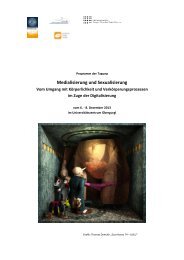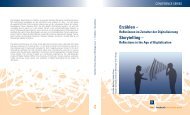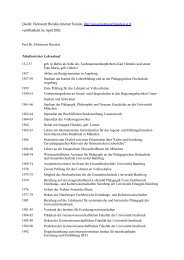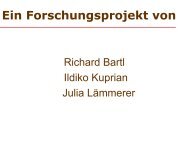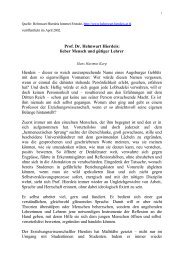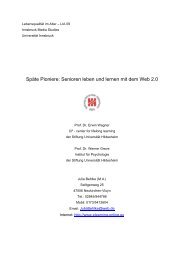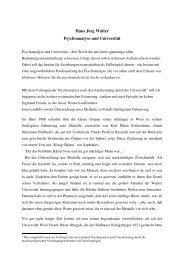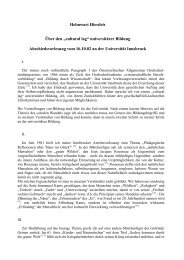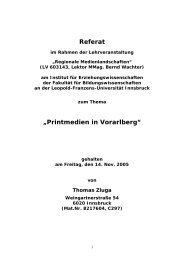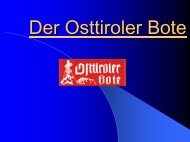Download pdf - Universität Innsbruck
Download pdf - Universität Innsbruck
Download pdf - Universität Innsbruck
Erfolgreiche ePaper selbst erstellen
Machen Sie aus Ihren PDF Publikationen ein blätterbares Flipbook mit unserer einzigartigen Google optimierten e-Paper Software.
120 Andrea Hemetsberger<br />
the forms of a title of nobility (Bordieu, 1986). By generously sharing their products and<br />
its source code, F/OSS developers create an abundance of economic, cultural, educational,<br />
and symbolic capital (Raymond, 1999), which liberates consumers from being indebted<br />
and constrained. By embracing all four kinds of capital, the F/OSS movement gained substance<br />
and power. The free flow of those assets lies at the core of the community’s attempt<br />
of liberation from the stranglehold of the market. Sharing, thus, becomes a powerful<br />
means of progression and emancipation. This article aims to investigate and understand<br />
social practices of sharing within F/OSS communities, and discuss its implications for<br />
sharing and accumulation of capital in online communities, in general.<br />
Method<br />
This research applies a qualitative, interpretive approach, including netnographic elements<br />
(Kozinets, 2002). One data set used for analysis herein consists of a web survey among<br />
individuals involved in open-source projects. The survey was posted at the most frequented<br />
community site – slashdot.com. Respondents were asked to report freely about<br />
their involvement with open-source, the motivations for their involvement, what they think<br />
they have gained through their participation, and the projects they are involved in. 1139<br />
full responses were analyzed. Depending on the quality and amount of their contributions<br />
to the community, subjects were classified either as core, contributors, or public users/affiliates.<br />
Content analysis was applied to uncover respondents’ motivations and viewpoints<br />
on practices of sharing within the F/OSS network. Content categories were deduced<br />
from contemporary theories on motivation, social exchange, gift-giving, and sharing.<br />
Non-participatory ‘netnographic’ inquiry (Kozinets, 2002) and ‘grounded theory’ (Strauss,<br />
1987; Goulding, 2002) have been chosen as appropriate methods of conducting research<br />
into the cultural aspects of online consumer communities. Accordingly, several online<br />
sources and project sites within a time span of more than ten years have been sampled and<br />
analyzed to provide additional insights into practices and dynamics of sharing in different<br />
F/OSS projects. Relevant sources for observation and reading had been chosen based on<br />
the number of hyperlinks, the amount of traffic, and the number of postings on the respective<br />
site. Online sources comprised Slashdot.com, a moderated site that is dedicated to<br />
news for people interested in online technology, open source, software and computers in<br />
general, and general societal and political-ideological developments. Further investigated<br />
sites implied more technology and F/OSS related discussions on freshmeat.com, sourceforge.net,<br />
sfs.org, opensource.org, eZines as for instance linuxtoday.com, wired.com, and<br />
their regional counterparts in Germany and Austria: heise.de, or futurezone.at. Discourse<br />
analysis and constant comparative method (Charmaz, 2006) was applied to uncover practices<br />
of sharing, and to understand online systems of sharing.



